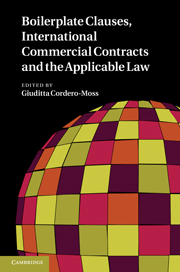Book contents
- Frontmatter
- Contents
- List of contributors
- Preface
- Introduction
- PART 1 How contracts are written in practice
- PART 2 Methodological challenges
- PART 3 The applicable law's effects on boilerplate clauses
- Introduction to Part 3
- 7 The common law tradition: application of boilerplate clauses under English law
- 8 The Germanic tradition: application of boilerplate clauses under German law
- 9 The Romanistic tradition: application of boilerplate clauses under French law
- 10 The Romanistic tradition: application of boilerplate clauses under Italian law
- 11 The Nordic tradition: application of boilerplate clauses under Danish law
- 12 The Nordic tradition: application of boilerplate clauses under Finnish Law
- 13 The Nordic tradition: application of boilerplate clauses under Norwegian law
- 14 The Nordic tradition: application of boilerplate clauses under Swedish law
- 15 The East European tradition: application of boilerplate clauses under Hungarian law
- 16 The East European tradition: application of boilerplate clauses under Russian law
- Conclusion: the self-sufficient contract, uniformly interpreted on the basis of its own terms: an illusion, but not fully useless
- Bibliography
- Index
12 - The Nordic tradition: application of boilerplate clauses under Finnish Law
from PART 3 - The applicable law's effects on boilerplate clauses
Published online by Cambridge University Press: 11 April 2011
- Frontmatter
- Contents
- List of contributors
- Preface
- Introduction
- PART 1 How contracts are written in practice
- PART 2 Methodological challenges
- PART 3 The applicable law's effects on boilerplate clauses
- Introduction to Part 3
- 7 The common law tradition: application of boilerplate clauses under English law
- 8 The Germanic tradition: application of boilerplate clauses under German law
- 9 The Romanistic tradition: application of boilerplate clauses under French law
- 10 The Romanistic tradition: application of boilerplate clauses under Italian law
- 11 The Nordic tradition: application of boilerplate clauses under Danish law
- 12 The Nordic tradition: application of boilerplate clauses under Finnish Law
- 13 The Nordic tradition: application of boilerplate clauses under Norwegian law
- 14 The Nordic tradition: application of boilerplate clauses under Swedish law
- 15 The East European tradition: application of boilerplate clauses under Hungarian law
- 16 The East European tradition: application of boilerplate clauses under Russian law
- Conclusion: the self-sufficient contract, uniformly interpreted on the basis of its own terms: an illusion, but not fully useless
- Bibliography
- Index
Summary
Introduction
The general starting point in Finnish contract law, as it usually is in countries with market economies, is pacta sunt servanda and that each party must carry his or her own risk as to how the contracted obligations will develop. The Finnish Contracts Act of 1929 is almost completely identical to the Danish, Norwegian and Swedish Contracts Acts, which have served as models for the Finnish Contracts Act. Moreover, the Sales of Goods Acts in Finland, Norway and Sweden are, with the exception of some minor differences, identical. However, Finland has no comprehensive civil code like, e.g., the German BGB or the French Civil Code. Instead, the general principles of contract law are not codified, which makes case law and doctrine important as legal sources in the field of contract law in Finland. In substance, the principles of Finnish law on contracts are the same as in the other Scandinavian countries.
The basic principles of Finnish contract law that seem relevant in this context are good faith and loyalty in contractual relationships and fairness. The underlying idea is to conceive a contractual relationship as a cooperative project for the parties instead of an arrangement which entitles a party to a contract to pursue only his or her own interests. In general, these principles impose a duty to also take into consideration the interests of the other party.
- Type
- Chapter
- Information
- Publisher: Cambridge University PressPrint publication year: 2011



